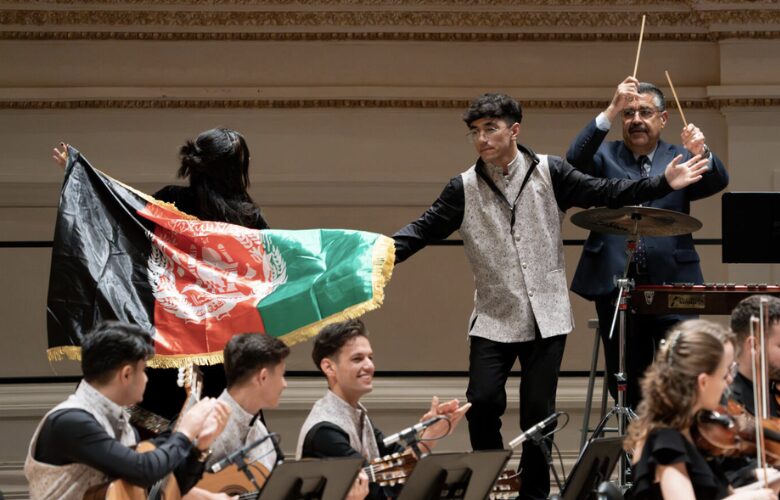Exiled Afghan Youth Orchestra Triumphs at Carnegie Hall

The Afghan Youth Orchestra, comprised of talented young musicians from the Afghanistan National Institute of Music (ANIM), recently delivered a powerful performance at Carnegie Hall in New York City. This ensemble, which includes musicians aged 14 to 22, plays both Western and traditional Afghan instruments, representing a unique blend of musical cultures. Despite the challenges of exile and the oppressive regime in their homeland, these young artists have become symbols of hope and resilience for Afghanistan.
The orchestra’s path to Carnegie Hall has been fraught with danger and hardship. After the Taliban returned to power in Afghanistan in August 2021, music was effectively banned in the country, and many feared they would never play their instruments again.
Under the Taliban’s austere rule, not only any forms of music are prohibited, but women face severe restrictions on their freedoms, not allowing them more than six grade education. Against this backdrop, the Afghan Youth Orchestra’s performance, that proudly features female musicians, at one of the world’s most prestigious venues is a profound statement of defiance and endurance.

According to Ahmad Sarmast, the founder and director of ANIM, the concert at Carnegie Hall was a message of “resilience and resistance” to the people of Afghanistan, especially the youth. “In spite of all the challenges and difficulties they are going through, they are still strong,” Sarmast told NBC News. The performance was not just a display of musical talent but a powerful act of protest against the Taliban’s suppression of Afghan culture and music.
The orchestra, now based in Braga, Portugal, after being granted asylum there, continues to represent a beacon of hope. The students of ANIM, who have faced threats and violence from the Taliban in the past, including a suicide bombing in 2014 that targeted the school, have shown remarkable courage and determination. After the Taliban regained control, Sarmast realized the urgent need to evacuate the school’s staff and students, fearing they would be targeted for their involvement in music. Portugal was the only country to respond quickly, offering asylum to 284 members of the school community.
Now, as an orchestra in exile, they continue to keep Afghanistan’s musical traditions alive. The Carnegie Hall concert marked their first performance in the United States in over a decade. The program featured a mix of Afghan folk music, Western symphonic works, and original compositions, showcasing the ensemble’s versatility and cultural richness. The young musicians performed alongside members of the European Union Youth Orchestra, highlighting a beautiful fusion of Eastern and Western musical traditions. The musicians, dressed in traditional Afghan attire, played a variety of Afghan instruments, bringing the sounds of their homeland to life in one of the world’s most renowned concert halls.

Zinat Hanif, a 16-year-old cellist, emphasized the importance of preserving Afghan music amid the current political climate. “Of course, we miss Afghanistan, but we are here to protect our music, to not silence Afghan music,” Hanif said to NBC News. This sentiment was echoed by many of the performers, who see their music as a means of protest against the Taliban’s restrictions and a way to maintain a connection to their culture.
The event concluded with two Afghan dancers carrying the Afghan flag, symbolizing hope and a desire for freedom. Sarmast, speaking at the end of the concert, highlighted the symbolic nature of their performance, stating that “Afghanistan is a silent country,” but through their music, they have “broken that silence”.
Images: Courtesy of the Afghan National Institute of Music
back to Home
Editor's Note: At StageLync, an international platform for the performing arts, we celebrate the diversity of our writers' backgrounds. We recognize and support their choice to use either American or British English in their articles, respecting their individual preferences and origins. This policy allows us to embrace a wide range of linguistic expressions, enriching our content and reflecting the global nature of our community.
🎧 Join us on the StageLync Podcast for inspiring stories from the world of performing arts! Tune in to hear from the creative minds who bring magic to life, both onstage and behind the scenes. 🎙️ 👉 Listen now!
